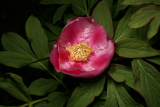Additional notes (click to expand)
Commemorative
The glorious peony, commemorates Paeon, physician to the gods of ancient Greece, who enjoyed the best private practice of the era. Homer’s Iliad v. 401 and 899 (c. 800 BC) provides further details (Murray, 1924). The name Paeon came to be associated as being Apollo, Greek god of healing, poetry, the sun and much else, and father of Aesculapius/Asclepias. Hesiod, the greatest Greek author after Homer, about a century later, clearly regarded them as separate deities, viz:
If neither Phoebus Apollo does save us from death, nor Paean who knows remedies for everything.
The Mycenaean Greeks of the late Bronze Age (1600–1100 BC) worshipped a god of healing called Paiawon, ‘a divinity with a formidable knowledge of herbs and drugs ...’ (Graf, 2009), and Apollo was not known. Paiawon’s cult disappeared after the collapse of the Mycenaean world. The fusion of Paiawon/Paeon and Apollo occurred much later as both being names for the god of healing.
Theophrastus (c. 300 BC), repeated by Pliny (AD 79), wrote that if a woodpecker saw one
collecting peony seed during the day, it would peck out one’s eyes, and (like mandrake) the roots had to be pulled up at night by tying them to the tail of a dog, with the added warning that one’s ‘fundament might fall out’ (anal prolapse) if one cut the roots with a knife. Theophrastus, I am glad to say, thought this ‘far-fetched’, as did Pliny, viz: ‘all this, however, I take to be so much fiction, most frivolously invented to puff up their supposed marvellous properties’.
Oakeley, Dr. Henry. (2012). Doctors in the Medicinal Garden. Plants named after physicians. Royal College of Physicians.
link
Medicinal
In traditional herbal medicine:
The root is antispasmodic and tonic. A tea made from the dried crushed petals of various peony species has been used as a cough remedy, and as a treatment for haemorrhoids and varicose veins.
Plants for a Future 2020 https://pfaf.org/user/Plant.aspx?LatinName=Paeonia+mascula
Geographical distribution
- Africa, Northern Africa, Algeria
- Africa, Northern Africa, Morocco
- Asia-Temperate, Western Asia, Cyprus
- Asia-Temperate, Western Asia, Iran
- Asia-Temperate, Western Asia, Iraq
- Asia-Temperate, Western Asia, Israel
- Asia-Temperate, Western Asia, Lebanon-Syria
- Asia-Temperate, Western Asia, Turkey
- Europe, Southeastern Europe, Albania
- Europe, Southeastern Europe, Bosnia and Herzegovina
- Europe, Southeastern Europe, Bulgaria
- Europe, Southeastern Europe, Czech Republic
- Europe, Southeastern Europe, Greece
- Europe, Southeastern Europe, Italy
- Europe, Southeastern Europe, Romania
- Europe, Southeastern Europe, Yugoslavia
- Europe, Southwestern Europe, France
- Europe, Southwestern Europe, Spain
Podcast
Paeonia mascula (L.) Mill.
Family: PAEONIACEAEGenus: Paeonia
Species: mascula (L.) Mill.
Common names: Coral Peony
Distribution summary: N. Africa, Eurasia
Habit: Perennial
Hardiness: H6 - Hardy; very cold winter
Habitat: Damp meadows, sandy streamsides
Garden status: Currently grown
Garden location: Classical Europe & Middle East (M)
Flowering months: May
Reason for growing: Commemorative, medicinal


